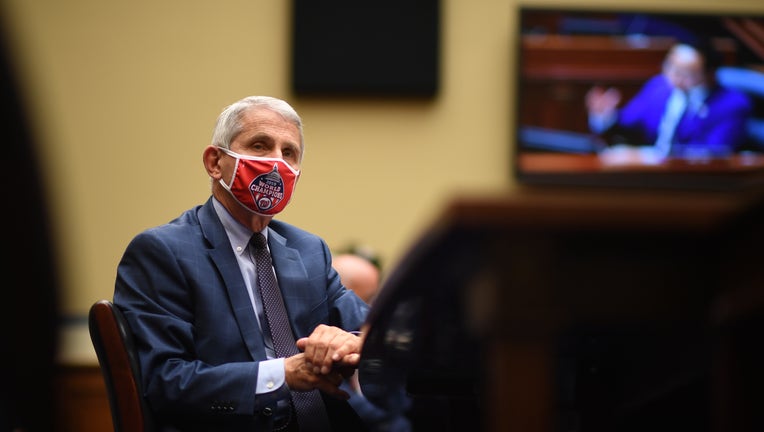‘The chances of it being 98% effective is not great’: Fauci says COVID-19 vaccine efficacy yet to be seen

FILE - Dr. Anthony Fauci testifies before a House Subcommittee on the Coronavirus Crisis hearing on July 31, 2020 in Washington, D.C. (Photo by Kevin Dietsch-Pool/Getty Images)
PROVIDENCE, R.I. - Dr. Anthony Fauci, the director of the National Institute of Allergy and Infectious Diseases, said that the chances of a coronavirus vaccine being more than 90% effective are “not great.”
The nation’s top infectious disease expert said during an Aug. 7 webinar hosted by Brown University that he hopes a coronavirus vaccine could be 75% effective, but one that is 50% to 60% effective would also be acceptable.
“We don’t know yet what the efficacy might be. We don’t know if it will be 50% or 60%. I’d like it to be 75% or more,” Fauci said. “What I’m shooting for is somewhere between really good control and elimination.”
RELATED: Moderna details coronavirus vaccine pricing as orders roll in
“The chances of it being 98% effective is not great, which means you must never abandon the public health approach,” Fauci said.
Fauci said that an early edition of the COVID-19 vaccine would likely not capture a person’s natural immunities in the same way as vaccines for measles, smallpox, polio and other illnesses that have been virtually eradicated in the U.S.
In the webinar, Fauci also said that another broad economic shutdown would not be needed to help weaken the spread of the novel coronavirus, so long as officials across the nation take the proper steps to help reduce COVID-19 infections in the fall and winter.
Key data on the safety and efficacy of the COVID-19 vaccines in development could come as soon as November, Fauci said, noting that there has been progress in the development of therapeutics to help treat those with COVID-19.
While the world hopes for a vaccine, Fauci added that in order to make real progress against the deadly virus, people across the country should abide by a set of key practices to help reduce the spread of COVID-19, regardless of whether a vaccine is available or not, including wearing a mask, physical distancing, avoiding crowds and washing hands.
Fauci said that states whose residents have continued to consistently practice public health principles have seen lower infection rates than those with more relaxed restrictions.
“What I’m shooting for is that with a vaccine and good public health measures, we can bring it down to somewhere between really good control and elimination,” Fauci said. “So that’s what a vaccine is going to do, but it’s not going to do that alone.”
He urged states seeing upticks of even 1% to 2% in coronavirus cases to respond quickly and decisively, as those increases will never reverse themselves without public health interventions.
RELATED: Novavax’s 1st-stage coronavirus vaccine study finds all volunteers developed viral antibodies
Fauci’s warnings came as many parts of the country continued to see spikes in COVID-19 infections and as children in several states prepared to return to school, even while parents and education officials continued to debate the risks of COVID-19 spread within educational institutions.
As of Aug. 10, the number of confirmed COVID-19 infections in the United States had surpassed 5 million, with the U.S. tallying more than 163,000 total deaths from the virus, the highest in the world, according to data from Johns Hopkins University.
Aug. 10 data from the New York Times’ Coronavirus Vaccine Tracker showed that eight vaccines were in large-scale efficacy tests and 11 were in expanded safety trials.
An Aug. 7 poll from Gallup showed as many as one in three Americans said they would not get a vaccine for COVID-19, even if the vaccine was FDA-approved and there was no cost out-of-pocket.
The Associated press contributed to this story.


